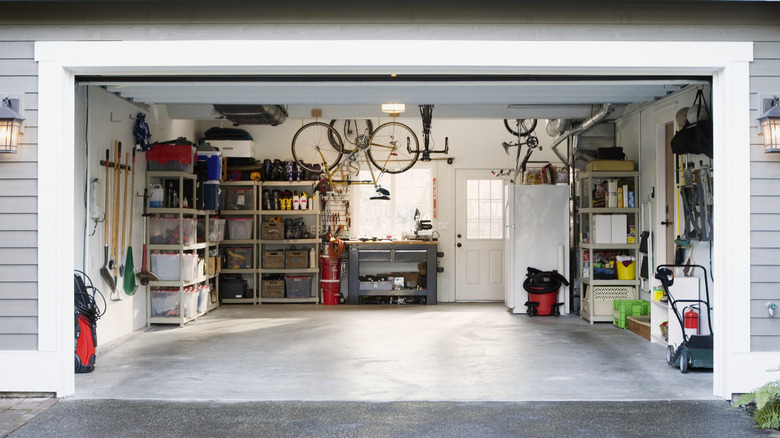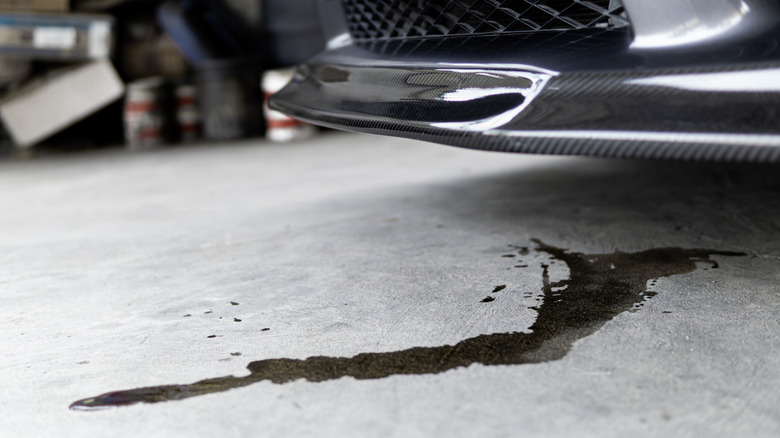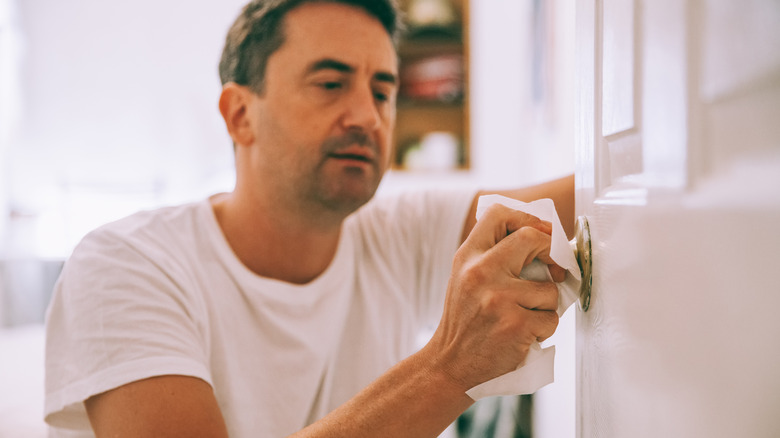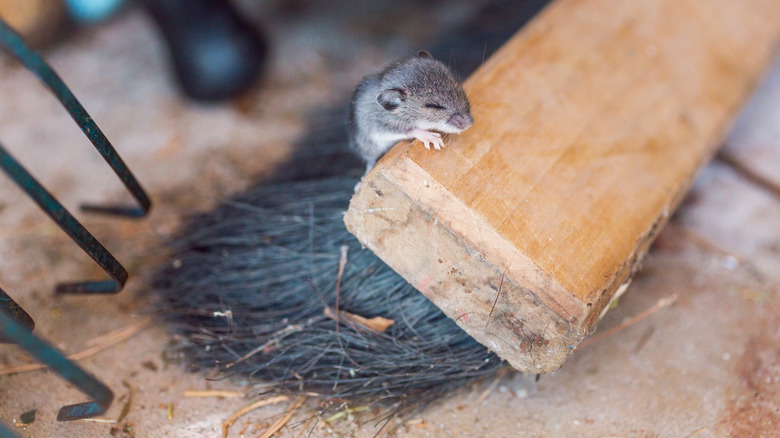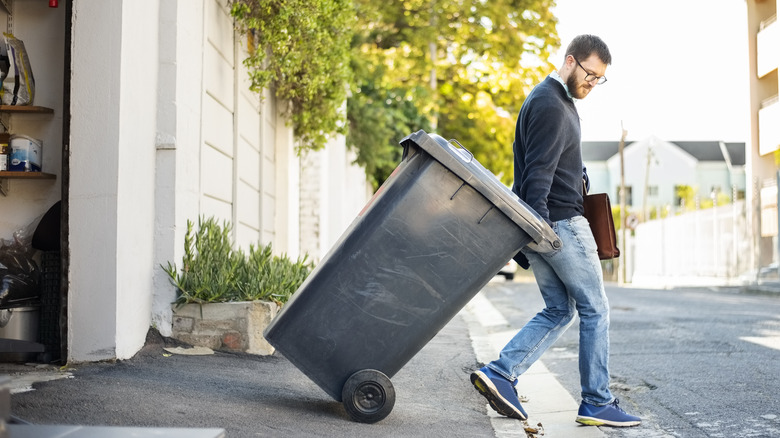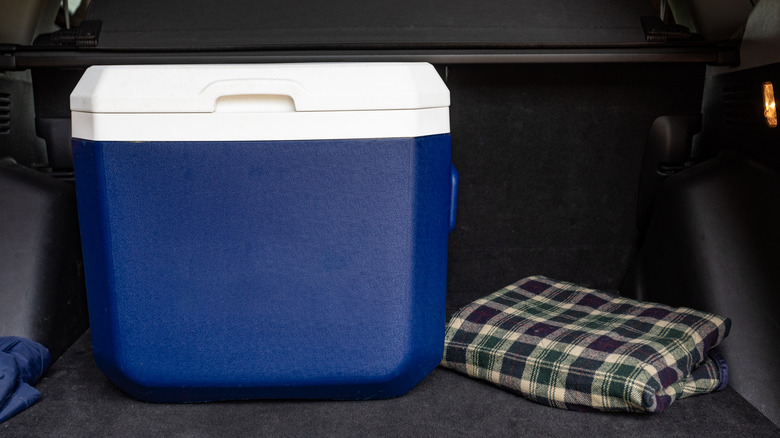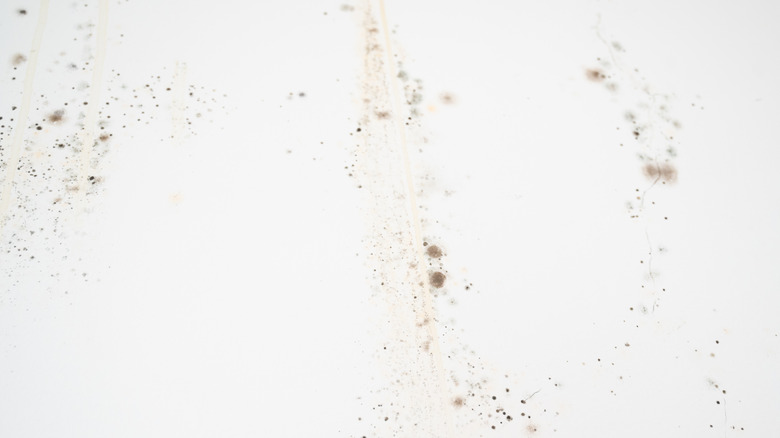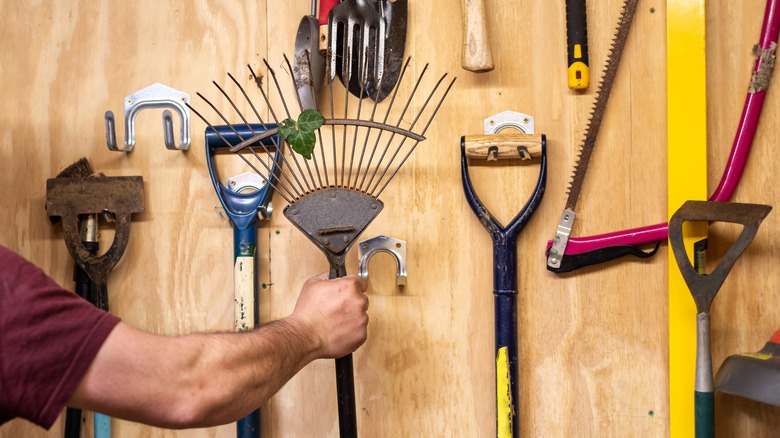9 Reasons Why You Should Keep A Bottle Of Hydrogen Peroxide In Your Garage
Remember when hydrogen peroxide was only kept on hand for cleaning out cuts and abrasions? It's not preferred for first aid anymore since it can irritate wounds and impede healing. You can use it to clean and disinfect many different surfaces and materials in your garage, though. How does it work? Hydrogen peroxide is water with an additional oxygen molecule added to it. When that extra oxygen particle reacts with a surface, it begins to bubble, imparting its cleansing and sanitizing oomph. If you start to use the peroxide you have on hand and notice it's not foamy, it's time to discard it and purchase a new bottle.
There are some safety considerations, however, since hydrogen peroxide is indeed a chemical. First, storing it in an area where children and pets can't access it is wise as is keeping it in the original brown bottle or a brown spray bottle to preserve its potency. Also, plan to open the garage door or a window when you use hydrogen peroxide to clean or disinfect, since there's a possibility of toxicity if you breathe it in. Carefully apply it, and consider wearing gloves since it can be hard on eyes and skin. Once you've got your precaution punch list out of the way, you'll be ready to try a number of different uses for a bottle of hydrogen peroxide in the garage.
1. Cleaning oil stains
If you're wondering what type of hydrogen peroxide to keep on hand for oil spills and other cleaning tasks, a 3% solution (or medical grade) is good for use around the house. Sometimes you can soak up fresh oil with paper towels and clean it with dish soap and water. If it's been sitting for awhile, making a paste using hydrogen peroxide and flour or baking soda and spreading it liberally on the stain might work better. Allow it to sit overnight, and then scrape up the residue the next day.
2. Remove skunky odors
If you have the misfortune to get sprayed by a skunk on your property, having a bottle of hydrogen peroxide out on your work bench can come in handy. After all, there's a good chance you're going to be confined to the garage until you get rid of some of that foul odor. This can mean removing clothing and washing it out in a bucket filled with one part hydrogen peroxide to six parts water and soaking it for up to two hours. After they soak, rinse the garments with cool water and launder as usual.
3. Disinfecting knobs and light switches
Hydrogen peroxide works well to disinfect lots of germy spots in your home when it comes to kitchens and bathrooms. Is it good for disinfecting in the garage, too? Yes, as a matter of fact, it is. In some ways, it's even more important to make a point to disinfect the door knobs and light switches in the garage, since they're often touched with dirty hands as we come in and out, and they can easily be overlooked when you're doing your regular house cleaning. Don't forget the garage door remote and alarm system keypads, too.
4. Remove rusty stains
You may have heard that you can get rid of stubborn household stains with hydrogen peroxide, and that's certainly true. It's easy to take the bubbly cleaning power of hydrogen peroxide out in the garage as well and it works even better when you add a mild abrasive like baking soda to the mix. To get rusty stains out of concrete, making a paste using baking soda and hydrogen peroxide can do the trick. Simply apply it to the stained area, scrub it until clean, and then rinse the dirty paste away with clean water.
5. Clean rodent droppings
There are many hydrogen peroxide pest control hacks that really work. Unfortunately, controlling rats and mice isn't one of them. This is one of the disinfecting liquids that does do a good job of helping you clean up after them, though, since their droppings can carry diseases like Salmonella. Wearing gloves and a mask, spray the droppings with hydrogen peroxide, use a paper towel to pick them up, and then place everything in a sealed plastic bag. Spray the area with more hydrogen peroxide to further sanitize it. Discard the bag, gloves, and mask in an outdoor trash bin.
6. Regularly clean trash cans
Considering all the icky stuff that gets tossed in the garbage can in your garage, it's a good idea to clean it regularly. You can certainly do that with soap and water initially to remove heavy grime and then let it dry in the sun or dry it with a towel. After the big clean is out of the way, spray on hydrogen peroxide both inside and out to further disinfect the receptacle. Once it's clean, regularly spraying your trash bin liberally with hydrogen peroxide and then rinsing with water can keep it clean and odorless.
7. Tidy up a cooler
After a fun camping trip or a productive fishing outing, you might decide that your cooler needs a thorough cleaning before you stow it away for next time. It stands to reason that since 3% hydrogen peroxide comes in a plastic bottle, you can use it to clean hard plastics without worry. Spritz it on and swipe it away with a sponge, or pour some on a rag and wipe the inside of the cooler out thoroughly. Not only will your cooler be clean, but any lingering odors and germs should be eliminated as well.
8. Clean moldy garage doors
When things get a bit too damp in and around your garage, there's always a chance that mold and mildew can start to grow; there are a number of different solutions you can use to remove them on surfaces like doors and walls. If you'd rather avoid harsh products like bleach for this type of cleaning, hydrogen peroxide is an alternative that is less toxic and it does indeed kill fungi. Apply it by spritzing with a spray bottle, and then use a sponge to scrub the dirty surface clean.
9. Clean garden tools and planters
Keeping gardening tools clean is a good way to avoid spreading disease from one type of plant, shrub, or tree to another. For this reason, regularly cleaning and disinfecting your tools–including wooden handles–before you stow them away makes sense. To do so, mix hydrogen peroxide with water in a spray bottle and wet the surface. Let the solution sit for about 20 minutes, then rinse with water and dry. If you have a plastic or ceramic pot or planter you'd like to disinfect before using it again, hydrogen peroxide works for that purpose, too.
